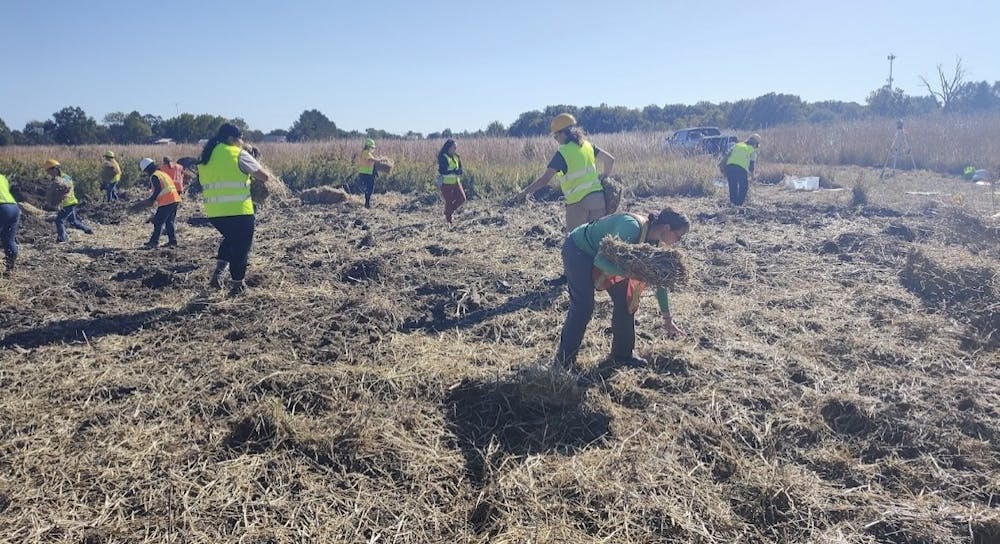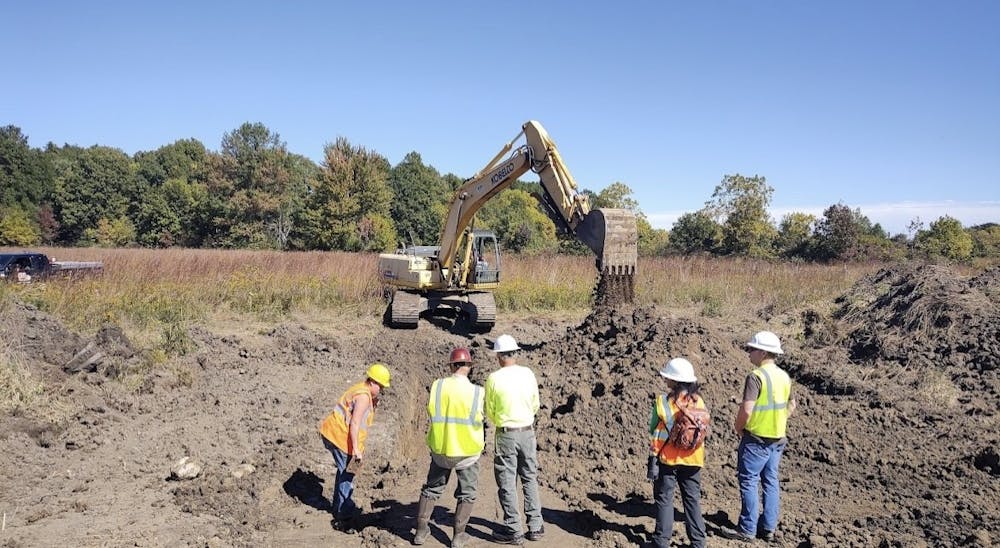Saturday, representatives from Ball State Department of Biology held day one of a two-day wetland workshop. At 8 a.m. the group met at Cooper Farm Property, before heading into the field.
After a brief donut breakfast, the instructions were laid out and the goals were explained. Tom Biebighouser led the charge and explained the project to the students.
“Most wetland projects are designed years in advance, and there's a lot of planning that goes into them, a lot of analysis, a lot of engineering involvement,” he said.“I'm going to show you some shortcuts. I'm going to show you how you can build a wetland and how you can design it in less than two days.”
Cooper Farm was used for farming from the 1850s-1950s. According to Ball State Land Manager and Restoration Ecologist John Taylor, during the 1980s, the farm was put in a trust with First Merchants Bank and Doctor Robert Cooper. As long as the land is used for this, Ball State can keep doing work there.
Taylor keeps the area maintained. He mows different paths for students to get to their research areas, including what he thought would be a close boundary for the wetland.
The first step for the group was to measure the ground level in the area where the wetland was going to be built. To do this, Bibighouser brought out a laser and set it in one spot.
The laser made the area into an imaginary grid, then he made students go around with a measuring rod. Once they extended the rod to the correct height, the rod made a solid sound.
Then participants went around and placed pink ribbons to mark the wetland boundaries. Matt Neff, a restoration ecologist with Heartland Restoration explained why participating in this workshop is important.
“With all the housing development going on, we’re destroying [wetlands] every day,” he said. “We need to restore them for water drainage purposes and for wildlife. You can’t keep complaining about water issues if you're not going to help take care of it.”
Afterward, it was time to start digging. First, a test plot around six feet deep was dug with an excavator.

Participants lay out hay and straw to help stop erosion for the wetland restoration on Cooper Farm Property Oct. 1, 2022. Cooper Farm, owned by Ball State University, was put in a trust with First Merchants Bank and Doctor Robert Cooper in the 1980s. John Taylor, Photo Provided
During the workshop, Bibighouser helped instruct the excavator operator as he dug up the area where the underground dam was to be placed.
After showing the participants how to measure the plot and what the different soil meant, Assistant Professor of Natural Resources and Environment Management Jesse Haeft held an activity.
The participants went around to three tables and learned about the soils in wetlands. They were able to touch and feel the different types.
“The objective of this is to estimate the clay percentage,” Haeft said. “Which is a very small particle that helps us determine whether this wetland will hold water. The more clay we have the better.”
Most of the participants were either with Ball State or in a business that dealt with wetlands. Most of them were from Indiana, a few were not.
One was from Texas, but Jason Latremoille traveled across the border from Toronto, Ontario, Canada.
“I work for an engineering company in Toronto,” he said. “I have been trying to go to one of Tom’s [Biebighouser] workshops for a while. Considering it was a weekend and it was actually the closest he’d be, I took the chance.”
Veronica Hamilton, a second-year master's student and biology major, was one of the multiple Ball State students participating.
“I served in the Air Force for five years,” she said. “When I got out I knew I had a passion for science, so I went to Ball State as an undergraduate and got my Bachelors of Science in Biology, and then went into the white lab, which is in the biology department, and got accepted into a master's program with them.”
She then went on to explain why this workshop is important for her major.
“I think that there's a lot of value here with learning, growing as a community, and also networking, so we're all coming out here from different backgrounds,” she said.“I've talked to botanists, plant specialists, and herpetologists. I personally study algae, so this is pretty interesting. I'm working in wetlands in Alaska, so learning about how a wetland is being constructed is really valuable for my major.”
Saturday the group got as far as digging up a trench and installing the underwater dam. Afterward, participants were invited to lectures at BSU Biology for more information on the topics of wetlands.
On Sunday, the group returned to finish the project. The first thing they did was check to see what invasive species were in the area and discussed how to stop them.
The next step was to try different techniques for controlling erosion and to meet the requirements for native plant species. For erosion, the participants put straw down and planted cover crops.
This led to the participants learning how to use wetlands to better impact rare species and to last for the future. The group also learned about different types of locations where a wetland would work and how to design them depending on the area.
During the winter, Taylor said he will return to the spot and plant natural species of plants.
To end the workshop, each participant was awarded a certificate for completing it.
Contact Zach Carter with comments atzachary.carter@bsu.edu or on Twitter @ZachCarter85.





